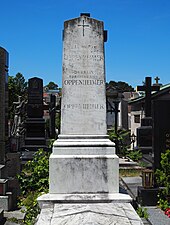Ludwig von Oppenheimer
Ludwig Freiherr von Oppenheimer (also Ludwig Baron Oppenheimer, born as Ludwig John Oppenheimer August 21, 1843 in Leipzig , Kingdom of Saxony ; died November 27, 1909 in Vienna , Austria-Hungary ) was an Austrian landowner and politician.
Life
Ludwig John Oppenheimer was a son of the businessman John Berend Oppenheimer, who died in 1872. He attended the Nikolai-Gymnasium in Leipzig and the Friedrichswerder Gymnasium in Berlin. He studied law and political science in Leipzig from 1860 to 1862 and worked on agricultural goods in Saxony and Braunschweig. In 1867 he acquired the Kleinskal estate in Bohemia, which he sold in 1902, but remained involved in the brewery. Oppenheimer was in Austria-Hungary in 1868 for Knight ennobled and 1878 for Baron . Von Oppenheimer was a member of the board of directors of the Österreichische Boden-Creditanstalt in Vienna, the south-north German connecting railway and other companies in Bohemia .
Von Oppenheimer was a member of the Bohemian Landtag from 1873 to 1883 and from 1875 to 1895 a member of the Austrian House of Representatives and from 1895 a lifelong member of the Austrian Manor House . He was a member of the parliamentary group of the Center Club, then the Liberal Club, then the United Left , then the German-Austrian Club, and from 1888 he belonged to the United German Left . In the mansion he was a member of the constitutional party .

Von Oppenheimer married Gabriele (called Yella) von Todesco (1854–1943), daughter of the textile manufacturer Eduard von Todesco (1814–1887) and the Salonnière Sophie von Todesco (1825–1895) in 1872 . He lived in the Palais Todesco in Vienna until his divorce in 1883 . Their son Felix von Oppenheimer (1874–1938) grew up with their mother.
Fonts (selection)
- About directing the German emigration to Hungary . Leipzig: Kollmann, 1866
- (Anonymous): On the situation in Bohemia . Prague: Calve 1869
- After the elections . Prague: Calve 1869
- (Anonymous): Thoughts on Austrian politics in the future . Leipzig: Baensch 1870
- (Anonymous): Austriaca. Reflections and highlights . Leipzig: Duncker & Humblot 1882
literature
- Reinhard Müller : Ludwig Freiherr von Oppenheimer , at: Archives for the History of Sociology in Austria (AGSO), University of Graz, 2008
- Oppenheimer, Ludwig John Ritter von (1868), Freiherr von (1878) , at: Republic of Austria, Parliament
- Felix Freiherr von Oppenheimer: Baron Ludwig Oppenheimer. A sheet of memory from his son . Vienna: C. Fromme, 1915
Web links
- Literature by and about Oppenheimer, Ludwig Freiherr from 1843-1909 in the bibliographic database WorldCat
| personal data | |
|---|---|
| SURNAME | Oppenheimer, Ludwig von |
| ALTERNATIVE NAMES | Oppenheimer, Ludwig John (maiden name); Oppenheimer, Ludwig Freiherr von |
| BRIEF DESCRIPTION | Austrian landowner and politician |
| DATE OF BIRTH | August 21, 1843 |
| PLACE OF BIRTH | Leipzig |
| DATE OF DEATH | November 27, 1909 |
| Place of death | Vienna |